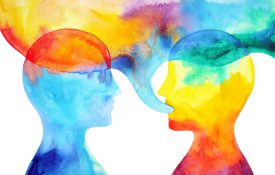-
Want to Seem More Likable? Try This
For many of us, meeting new people can be an anxiety-inducing affair. Am I talking too much? Was my handshake too weak? Did I make too much eye contact? Too little? Am I boring? Are they boring, but they’re boring because I’m boring? It can be a mess! All of our worst social paranoias contained in a single interaction. But there’s an easy way to get around this, simultaneously coming off as more likable while working to build a deeper, more genuine connection with someone: Ask questions. --- Imagine that! Being a genuine, sincere conversation partner makes people like you more. What a world.
-

New Research From Clinical Psychological Science
A sample of research exploring: pain and opioid misuse in children; meta-awareness of emotional attention; complicated grief and posstraumatic growth; intolerance of uncertainty and aggression; and central sensitization.
-

Familiar Voices Are Easier to Understand, Even If We Don’t Recognize Them
Familiar voices are easier to understand and this advantage holds even if we don’t actually recognize a familiar voice, researchers find.
-

New Research From Psychological Science
A sample of research exploring valence and arousal in emotion, self-affirmation and academic performance, and calculating mean numerosity.
-
Five myths about personality tests
In its earliest use in the 13th century, “personality” referred to the quality, character or fact of being human. By the 18th century, the word pointed to the traits that made a person a distinctive individual. The 19th and 20th centuries saw the rise of systems designed for the mass classification of human beings, including personality tests. Today, these tests are more beloved and far-reaching than ever, especially on websites like BuzzFeed and Facebook. These tools and typologies are based on powerful, enduring myths about what personality is and how we can measure it. Here are five.
-
Evacuation decision-making: How people make choices in disasters
After hurricanes Harvey and Irma, the National Science Foundation (NSF) funded research to investigate the broad impacts of these disasters. A year later, some of the researchers funded by awards from the agency's Social, Behavioral, and Economic Sciences Directorate are reporting results produced to date. This is the sixth article in the series. Roxane Cohen Silver, professor of psychological science, medicine, and public health at the University of California, Irvine studies the details of why people chose to evacuate or stay put as Hurricane Irma approached.

